广西桂林中学2014届高三10月月考英语试题(含答案)
- 格式:doc
- 大小:89.00 KB
- 文档页数:11
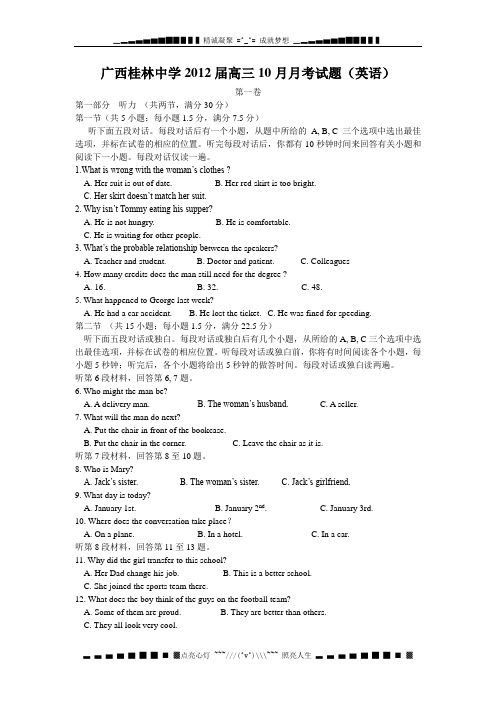
广西桂林中学2012届高三10月月考试题(英语)第一卷第一部分听力(共两节,满分30分)第一节(共5小题;每小题1.5分,满分7.5分)听下面五段对话。
每段对话后有一个小题,从题中所给的A, B, C 三个选项中选出最佳选项,并标在试卷的相应的位置。
听完每段对话后,你都有10秒钟时间来回答有关小题和阅读下一小题。
每段对话仅读一遍。
1.What is wrong with the woman’s clothes ?A. Her suit is out of date.B. Her red skirt is too bright.C. Her skirt doesn’t match her suit.2. Why isn’t Tommy eating his supper?A. He is not hungry.B. He is comfortable.C. He is waiting for other people.3. What’s the probable relationship be tween the speakers?A. Teacher and student.B. Doctor and patient.C. Colleagues4. How many credits does the man still need for the degree ?A. 16.B. 32.C. 48.5. What happened to George last week?A. He had a car accident.B. He lost the ticket.C. He was fined for speeding.第二节(共15小题;每小题1.5分,满分22.5分)听下面五段对话或独白。
每段对话或独白后有几个小题,从所给的A, B, C三个选项中选出最佳选项,并标在试卷的相应位置。
听每段对话或独白前,你将有时间阅读各个小题,每小题5秒钟;听完后,各个小题将给出5秒钟的做答时间。
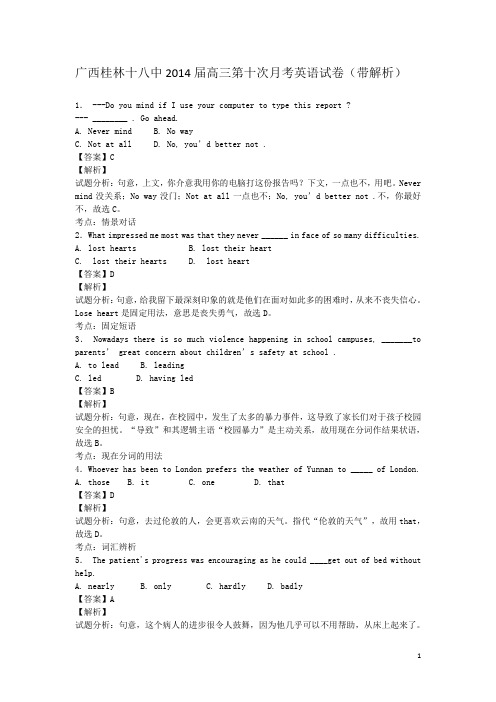
广西桂林十八中2014届高三第十次月考英语试卷(带解析)1. ---Do you mind if I use your computer to type this report ?--- ________ . Go ahead.A. Never mindB. No wayC. Not at allD. No, you’d better not .【答案】C【解析】试题分析:句意,上文,你介意我用你的电脑打这份报告吗?下文,一点也不,用吧。
Never mind没关系;No way没门;Not at all一点也不;No, you’d better not .不,你最好不,故选C。
考点:情景对话2.What impressed me most was that they never ______ in face of so many difficulties.A. lost heartsB. lost their heartC. lost their heartsD. lost heart【答案】D【解析】试题分析:句意,给我留下最深刻印象的就是他们在面对如此多的困难时,从来不丧失信心。
Lose heart是固定用法,意思是丧失勇气,故选D。
考点:固定短语3. Nowadays there is so much violence happening in school campuses, _______to parents’ great concern about children’s safety at school .A. to leadB. leadingC. ledD. having led【答案】B【解析】试题分析:句意,现在,在校园中,发生了太多的暴力事件,这导致了家长们对于孩子校园安全的担忧。
“导致”和其逻辑主语“校园暴力”是主动关系,故用现在分词作结果状语,故选B。
考点:现在分词的用法4.Whoever has been to London prefers the weather of Yunnan to _____ of London.A. thoseB. itC. oneD. that【答案】D【解析】试题分析:句意,去过伦敦的人,会更喜欢云南的天气。
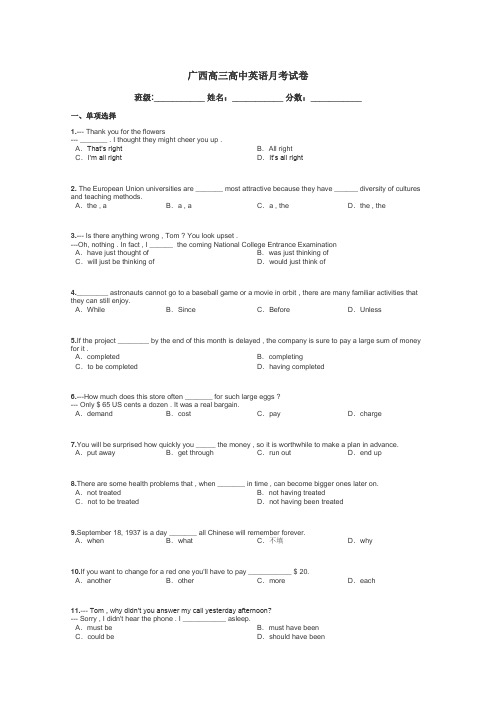
广西高三高中英语月考试卷班级:___________ 姓名:___________ 分数:___________一、单项选择1.--- Thank you for the flowers--- _______ . I thought they might cheer you up .A.That’s right B.All rightC.I’m all right D.It’s all right2. The European Union universities are _______ most attractive because they have ______ diversity of cultures and teaching methods.A.the , a B.a , a C.a , the D.the , the3.--- Is there anything wrong , Tom ? You look upset .---Oh, nothing . In fact , I ______ the coming National College Entrance ExaminationA.have just thought of B.was just thinking ofC.will just be thinking of D.would just think of4.________ astronauts cannot go to a baseball game or a movie in orbit , there are many familiar activities that they can still enjoy.A.While B.Since C.Before D.Unless5.If the project ________ by the end of this month is delayed , the company is sure to pay a large sum of money for it .A.completed B.completingC.to be completed D.having completed6.---How much does this store often _______ for such large eggs ?--- Only $ 65 US cents a dozen . It was a real bargain.A.demand B.cost C.pay D.charge7.You will be surprised how quickly you _____ the money , so it is worthwhile to make a plan in advance. A.put away B.get through C.run out D.end up8.There are some health problems that , when _______ in time , can become bigger ones later on.A.not treated B.not having treatedC.not to be treated D.not having been treated9.September 18, 1937 is a day _______ all Chinese will remember forever.A.when B.what C.不填D.why10.If you want to change for a red one you'll have to pay ___________ $ 20.A.another B.other C.more D.each11.--- Tom , why didn’t you answer my call yesterday afternoon?--- Sorry , I didn't hear the phone . I ___________ asleep.A.must be B.must have beenC.could be D.should have been12.Only after Mary read her article a second time _____the spelling mistakes.A.did she notice B.she noticedC.does she notice D.she has noticed13.If we ________ now to protect our mother river ---Li Jiang River , we ‘ll live to regret it.A.haven’t acted B.won’t actC.don’t act D.hadn’t acted14.Your story is perfect ; I’ve never heard ___before.A.the better one B.the best oneC.a better one D.a good one15.--- It is said that Mary’s father is very rich .--- ___________ She wouldn’t accept his help even if it were offeredA.No doubt B.What for C.So what D.No wonder二、完形填空阅读下面短文,从短文后各题所给的四个选项(A、B、C和D)中,选出可以填入空白处的最佳选项,并在答题卡上将该项涂黑。
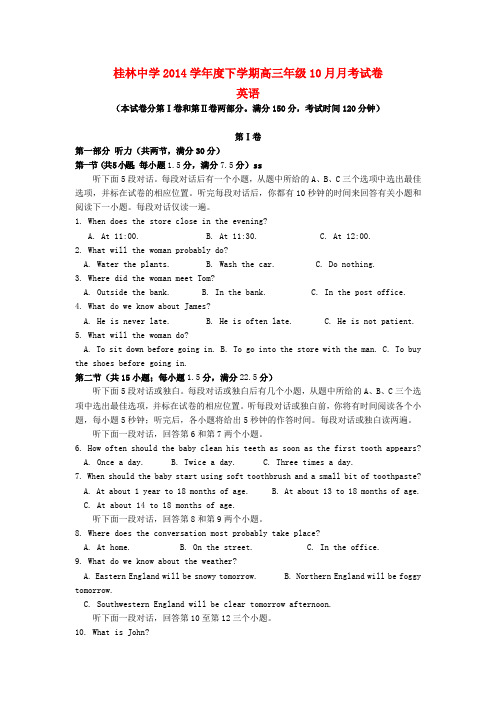
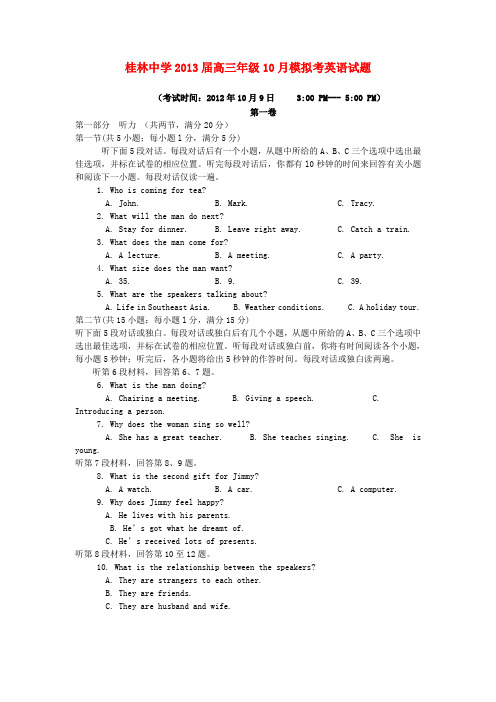
桂林中学2013届高三年级10月模拟考英语试题(考试时间:2012年10月9日 3:00 PM--- 5:00 PM)第一卷第一部分听力(共两节,满分20分)第一节(共5小题;每小题l分,满分5分)听下面5段对话。
每段对话后有一个小题,从题中所给的A、B、C三个选项中选出最佳选项,并标在试卷的相应位置。
听完每段对话后,你都有l0秒钟的时间来回答有关小题和阅读下一小题。
每段对话仅读一遍。
1. Who is coming for tea?A. John.B. Mark.C. Tracy.2. What will the man do next?A. Stay for dinner.B. Leave right away.C. Catch a train.3. What does the man come for?A. A lecture.B. A meeting.C. A party.4. What size does the man want?A. 35.B. 9.C. 39.5. What are the speakers talking about?A. Life in Southeast Asia.B. Weather conditions.C. A holiday tour. 第二节(共15小题;每小题l分,满分15分)听下面5段对话或独白。
每段对话或独白后有几个小题,从题中所给的A、B、C三个选项中选出最佳选项,并标在试卷的相应位置。
听每段对话或独白前,你将有时间阅读各个小题,每小题5秒钟;听完后,各小题将给出5秒钟的作答时间。
每段对话或独白读两遍。
听第6段材料,回答第6、7题。
6. What is the man doing?A. Chairing a meeting.B. Giving a speech.C. Introducing a person.7. Why does the woman sing so well?A. She has a great teacher.B. She teaches singing.C. She is young.听第7段材料,回答第8、9题。
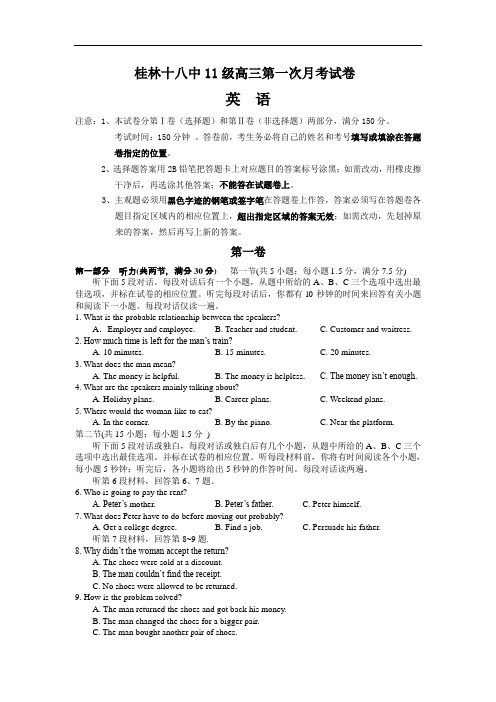
桂林十八中11级高三第一次月考试卷英语注意:1、本试卷分第Ⅰ卷(选择题)和第Ⅱ卷(非选择题)两部分,满分150分。
考试时间:150分钟。
答卷前,考生务必将自己的姓名和考号填写或填涂在答题卷指定的位置。
2、选择题答案用2B铅笔把答题卡上对应题目的答案标号涂黑;如需改动,用橡皮擦干净后,再选涂其他答案;不能答在试题卷上。
3、主观题必须用黑色字迹的钢笔或签字笔在答题卷上作答,答案必须写在答题卷各题目指定区域内的相应位置上,超出指定区域的答案无效;如需改动,先划掉原来的答案,然后再写上新的答案。
第一卷第一部分听力(共两节,满分30分)第一节(共5小题;每小题l .5分,满分7.5分) 听下面5段对话。
每段对话后有一个小题,从题中所给的A、B、C三个选项中选出最佳选项,并标在试卷的相应位置。
听完每段对话后,你都有l0秒钟的时间来回答有关小题和阅读下一小题。
每段对话仅读一遍。
1. What is the probable relationship between the speakers?A.Employer and employee. B. Teacher and student. C. Customer and waitress.2. How much time is left for the man’s train?A. 10 minutes.B. 15 minutes.C. 20 minutes.3. What does the man mean?A. The money is helpful.B. The money is helpless.C. The money isn’t enough.4. What are the speakers mainly talking about?A. Holiday plans.B. Career plans.C. Weekend plans.5. Where would the woman like to eat?A. In the corner.B. By the piano.C. Near the platform.第二节(共15小题;每小题1.5分)听下面5段对话或独白,每段对话或独白后有几个小题,从题中所给的A、B、C三个选项中选出最佳选项。
桂林中学2013-2014学年上学期高三年级10月月考英语科试卷第I卷(选择题,共四部分,满分105分)第一部分:听力理解(共两节,满分20分)第一节(共5小题;每小题1分,满分5分)听下面5段对话,每段对话后有一个小题,从题中所给的A、B、C三个选项中选出最佳选项,并标在试卷的相应位置。
听完每段对话后,你都有10秒钟的时间来回答有关小题和阅读下一小题。
每段对话仅读一遍。
1. What did the woman forget to do?A. put salt in the dishB. buy some saltC. make the dish for the man2. who will file the papers ?A. the womanB. MarshallC. Mr. Atkins3. What is the last thing the woman will do ?A. go to workB. go to hair salonC. go to the grocery store4. What hasn’t Bill done ?A. his homeworkB. the dishesC. sweeping the floor5. Where does the conversation take place?A. at a train stationB. at a bus stationC. at the airport 第二节(共15小题;每小题1分,满分15分)请听下面5段对话或独白。
每段对话或独白后有几个小题,从题中所给的A、B、C三个选项中选出最佳选项,并标在试题卷的相应位置。
听每段对话或独白前,你将有时间阅读各小题,每小题5秒钟;听完后,各小题将给出5秒钟的作答时间。
每段对话或独白读两遍。
请听第6段材料,回答第6至7题。
6. What does the man want to do ?A. book a roomB. buy some bed sheetsC. decorate his bedroom7. What can we learn from the conversation?A. there is a computer in the roomB. The pillows are filled with cottonC. the man is satisfied with room请听第7段材料,回答第8至10题。
桂林中学2013届高三年级10月模拟考英语试题(考试时间:2012年10月9日3:00 PM--- 5:00 PM)第一卷第一部分听力(共两节,满分20分)第一节(共5小题;每小题l分,满分5分)听下面5段对话。
每段对话后有一个小题,从题中所给的A、B、C三个选项中选出最佳选项,并标在试卷的相应位置。
听完每段对话后,你都有l0秒钟的时间来回答有关小题和阅读下一小题。
每段对话仅读一遍。
1. Who is coming for tea?A. John.B. Mark.C. Tracy.2. What will the man do next?A. Stay for dinner.B. Leave right away.C. Catch a train.3. What does the man come for?A. A lecture.B. A meeting.C. A party.4. What size does the man want?A. 35.B. 9.C. 39.5. What are the speakers talking about?A. Life in Southeast Asia.B. Weather conditions.C. A holiday tour.第二节(共15小题;每小题l分,满分15分)听下面5段对话或独白。
每段对话或独白后有几个小题,从题中所给的A、B、C三个选项中选出最佳选项,并标在试卷的相应位置。
听每段对话或独白前,你将有时间阅读各个小题,每小题5秒钟;听完后,各小题将给出5秒钟的作答时间。
每段对话或独白读两遍。
听第6段材料,回答第6、7题。
6. What is the man doing?A. Chairing a meeting.B. Giving a speech.C. Introducing a person.7. Why does the woman sing so well?A. She has a great teacher.B. She teaches singing.C. She is young.听第7段材料,回答第8、9题。
广西桂林中学高三10月月考英语考试时间:10月9日15:00 --- 17:00第一卷第一部分听力(共两节,满分30分)第一节(共5小题;每小题1.5分,满分7.5分)听下面五段对话。
每段对话后有一个小题,从题中所给的A, B, C 三个选项中选出最佳选项,并标在试卷的相应的位置。
听完每段对话后,你都有10秒钟时间来回答有关小题和阅读下一小题。
每段对话仅读一遍。
1. What does the woman want to watch?A. Weather forecast.B. World news.C. Film.2. What is the population of the city?A. 800000.B. 813000.C. 8134003. What does the woman mean?A. Dr. Cronin is busy at the moment.B. Dr. Cronin is waiting for a patient.C. Dr. Cronin has lost his patience.4. Where will the man’s family most likely stay during the holiday?A. In a tent.B. In a car.C. In a hotel.5. How long did it take the man to write the report?A. More than two hours.B. Not more than half an hourC. Less than one hour.第二节(共15小题;每小题1.5分,满分22.5分)听下面五段对话或独白。
每段对话或独白后有几个小题,从所给的A, B, C三个选项中选出最佳选项,并标在试卷的相应位置。
听每段对话或独白前,你将有时间阅读各个小题,每小题5秒钟;听完后,各个小题将给出5秒钟的做答时间。
广西桂林市桂林中学2017届高三10月月考英语试题第一部分听力(共两节,满分30分)第一节(共5小题;每小题1.5分,满分7.5分)听下面5段对话。
每段对话后有一个小题,从题中所给的A、B、C三个选项中选出最佳选项,并标在试卷的相应位置。
听完每段对话后,你都有10秒钟的时间来回答有关小题和阅读下一小题。
每段对话仅读一遍。
1. What are the monkeys doing?A. Eating.B. Lifting weights.C. Riding bikes.2. What information can the speakers get about the soldiers?A. Their birthdays.B. Their hobbies.C. Their hometowns.3. How many questions does the boy need to answer tonight?A. 9.B. 12.C. 29.4. Why does the woman need a new cell phone?A. She does not like her old phone.B. Her old phone no longer works.C. She lost her old phone.5. What are the speakers doing now?A. Having a picnic.B. Buying some tables.C. Cleaning the house.第二节(共15小题;每题1.5分,满分22.5分)听下面五段对话或独白,每段对话或短文后有几个小题,从题中所给的A、B、C三个选项中选出最佳选项,并标在试卷的相应位置。
听每段对话或独白前,你将有时间阅读各个小题,每个小题5秒钟;听完后,各小题将给出5秒钟的作答时间。
每段对话或独白读两遍。
听第6段材料,回答第6、7题。
桂林中学2013-2014学年上学期高三年级10月月考英语科试卷第I卷(选择题,共四部分,满分105分)第一部分:听力理解(共两节,满分20分)第一节(共5小题;每小题1分,满分5分)听下面5段对话,每段对话后有一个小题,从题中所给的A、B、C三个选项中选出最佳选项,并标在试卷的相应位置。
听完每段对话后,你都有10秒钟的时间来回答有关小题和阅读下一小题。
每段对话仅读一遍。
1. What did the woman forget to do?A. put salt in the dishB. buy some saltC. make the dish for the man2. who will file the papers ?A. the womanB. MarshallC. Mr. Atkins3. What is the last thing the woman will do ?A. go to workB. go to hair salonC. go to the grocery store4. What hasn’t Bill done ?A. his homeworkB. the dishesC. sweeping the floor5. Where does the conversation take place?A. at a train stationB. at a bus stationC. at the airport第二节(共15小题;每小题1分,满分15分)请听下面5段对话或独白。
每段对话或独白后有几个小题,从题中所给的A、B、C 三个选项中选出最佳选项,并标在试题卷的相应位置。
听每段对话或独白前,你将有时间阅读各小题,每小题5秒钟;听完后,各小题将给出5秒钟的作答时间。
每段对话或独白读两遍。
请听第6段材料,回答第6至7题。
6. What does the man want to do ?A. book a roomB. buy some bed sheetsC. decorate his bedroom7. What can we learn from the conversation?A. there is a computer in the roomB. The pillows are filled with cottonC. the man is satisfied with room请听第7段材料,回答第8至10题。
8. What is the probable relationship between the speakers?A. colleaguesB. policeman and drivers.C. doctor and patient9. What happened to Hal last night ?A. his friend damaged his carB. He stole some food from a storeC. he had a serious accident10. How many people were injured last night ?A. noneB. TwoC. three请听第8段材料,回答第11至13题。
11. Why does Adam want to take the rest?A. He has to go to the bathroomB. He wasn’t well – preparedC. He has to make it to the bus stop12. What will Adam do after class?A. take the test againB. go home immediatelyC. go over his assignment with his teacher13. How does the woman seem to feel in the end?A. HappyB. AngryC. Confused请听第9段材料,回答第14至16题。
14. Why was Julie crying ?A. she got wet in the rainB. She missed Ryan’s showC. Her boyfriend was late15. What do we know about the man ?A. He plays in a bandB. He plays footballC. He works behind the stage16. Where will the speakers go tomorrow night?A. To Ryan’s showB. To Julie’s houseC. To Ben’s football practice 请听第10段材料,回答第17至20题。
17. What is true about Mrs. Hansen?A. She is out of townB. She is easy-goingC. She expects a lot from her students18. What will the speakers do if she catches a student with a cell phone?A. Call the student’s parentsB. Take the phone awayC. Give extra homework19. When will the speaker send a student to the principal’s o ffice?A. if they fail to do their homeworkB. if they speak out of turnC. if they are late for class20. Who is Mrs. Sheen?A. the principalB. the substitute teacherC. the regular teacher第二部分:单项选择题(共15小题;每小题1分,满分15分)21. ____ with the size of the whole earth, the highest mountain does not seem high at all.A. When comparedB. While comparingC. CompareD. Comparing22. The girl didn’t know who ____ for the broken vase.A. will be blamedB. blamedC. was to blameD. blames23. Is this the reason ____ she explained in the report for her success in the job?A. whatB. thatC. howD. why24. – Would you like to attend the concert in honor of the great composer Mozart tonight?-- ______________.A. I certainly don’t wantB. Thank you anywayC. Not reallyD. I don’t think so25. Nanjing is ____ most beautiful city , where you can see ____ famous Changjiang River.A. a; theB. a; 不填C.the; aD. 不填; the26. He reached into his pocket and found his wallet ____.A. missedB. goneC. losingD. disappearing27. – What do you think of my suggestion? -- Er…I’m sorry. I ____ about something else.A. hadn’t thoughtB. thoughtC. was thinkingD. have been thinking28. It was ____ Li Ming had always been working hard that he was admitted to Beijing University last July. ____ the saying goes, “No pains, no gains.”A. as; ThoughB. because; AsC. for; IfD. since; Where29. The news was a terrible blow to her, but she will ____ the shock soon.A. get outB. get throughC. get offD. get over30. Actually, girls can be ____ they want to be just like boys, whether it is a pilot, an astronaut, or a general manager.A. whereverB. howeverC. whateverD. whoever31. – I think the company may not offer you a good pay. -- ____, I won’t take the job.A. That is to sayB. What is moreC. In other wordsD. In that case32. Look at the terrible situation I am in! If only I ____ your advice.A. followB. would followC. had followedD. have followed33. ____ he met with the difficulty did he realize the importance of our help.A. Even thoughB. Never untilC. Only beforeD. Ever since34. You _____ pay too much attention to your reading skill, as it is so important.A. cannotB. shouldC. mustD. needn’t35. – Did Mike go with you in the end? -- No, but I ____ him to.A. agreedB. hopedC. suggestedD. advised第三部分:完型填空(共20小题;每小题1.5分,满分30分)We all like to think that we are perfect to a fault. And whose fault is that? Not mine.Recently, my husband and I got up at the __36__ of 4 a.m. to catch an early __37__ to New York. We were extremely __38__, perhaps because we were sleep-walking. And we were all ready when the taxi came to __39__ us 45 minutes later.It was a quiet __40__ to the airport. We didn’t even chat, because he was enjoying his new iPod. At the airport, the taxi __41__ to let us get off, at which point the iPod guy __42__ me and said, “We don’t have our __43__.”“You are __44__, right?” I replied, for he __45__ lied like that.“No. I mean it. Did you bring it down? I didn’t .”“What do you mean; you didn’t?” I shouted. “All our things are there.”“ How __46__!” I was thinking, “You’re always __47__ to do things like bringing down luggage. This is your fault, __48__ now, we may __49__ our flight.” I didn’t say that out loud, __50__. He already knew how I felt.The experience showed I had a hard time accepting __51__. But what do you think of me? Psychologists think that the best way to assess ourselves is __52__ the eyes of others. We often don’t recognize that we’ve done wrong.Oh, and that missing suitcase? We went home __53__ in the taxi, picked it up, returned to the airport and made it through with minutes to __54__.Later, while walking along Broadway, I noted how __55__ I was. I hadn’t said a thing about his forgetting our suitcase at home.36. A. point B. hour C. strike D. period37. A. bus B. train C. flight D. taxi38. A. still B. excited C. calm D. disappoint39. A. collect B. pick C. fetch D. draw40. A. drive B. experience C. travel D. ride41. A. pulled in B. pushed in C. hurried in D. dragged in42. A. turned to B. turned up C. turned against D. turned away43. A. briefcase B. suitcase C. clothes bag D. food bag44. A. running B. laughing C. joking D. cheating45. A. rarely B. always C. hardly D. never46. A. clever B. stupid C. sad D. great47. A. expected B. asked C. requested D. supposed48. A. and B. if C. while D. but49. A. catch B. quit C. change D. miss50. A. either B. as well C. though D. besides51. A. punishment B. advice C. responsibility D. belief52. A. in B. through C. over D. on53. A. slowly B. carelessly C. sadly D. hurriedly54. A. spare B. use C. leave D. share55. A. stupid B. sorry C. wise D. funny第四部分:阅读理解(共20题;每小题2分,满分40分)AIf you travel to a new exhibit at the San Francisco Conservatory of Flowers, you will have chances to see some meat-eating plants. Take bladderworts (狸藻类植物), a kind of such plant, for example. They appear so small and grow in a quiet pond. “But these are the fastest-known killers of the plant kingdom, and able to capture a small insect in 1/50 of a second using a trap door!”Once the trap door closes on the victim, the enzymes (酶) similar to those in the human stomach slowly digest the insect. When dinner is over, the plant opens the trap door and is ready to trap again.Meat-eating plants grow mostly in wet areas with soil that doesn’t offer much food value. In such conditions, these amazing plants have developed insect traps to get their nutritional needs over thousands of years. North America has more such plants than any other continents.Generally speaking, the traps may have attractive appearance to fool the eye, like pitcher plants, which get their name because they look like beautiful pitchers (a container like a bottle) full of nectar (花蜜).The Asian pitcher plant, for example, has bright colors and an attractive half-closed lid. Curious insects are tempted to come close and take a sip, and then slide down the slippery (光滑的) slope to their deaths.Hair-like growths along the pitcher walls ensure that nothing can escape, and the digestive enzymes can get to work. A tiny insect can be digested in a few hours, but a fly takes a couple of days.Some of these pitchers are large enough to hold two gallons. Meat-eating plants only eat people in science fiction movies, but sometimes a bird or other small animals will discover that a pitcher plant isn’t a good place to get a drink.56. From the first paragraph, we learn that bladderworts can ____.A. kill an insect in a secondB. capture an insect in 1/50 of a secondC. be found floating on a quiet lakeD. digest a fly in a few hours57. If the trap door of a meat-eating plant is closed, the plant is ____.A. fooling insects into taking a sipB. producing nectarC. tempting insects to come closeD. enjoying a dinner58. Meat-eating plants can grow in wet and poor soil because they ____.A. can get nutrition from animalsB. don’t need much food valueC. can make the most of such conditionsD. have developed digestive enzymes59. What can be captured by meat-eating plants for food?A. A childB. A dogC. A little birdD. A little fishBIt is often necessary to release a fish, that is, set it free after catching, because it is too small, or you just don’t want to take it home to eat. In some cases, releasing fish is a good measure that will help keep fish variety and build their population size. The Department of Game and Inland Fisheries (DGIF) encourages fishermen who practice catch-and-release fishing to use a few simple skills when doing so. The advice provided below will help make sure that the fish you release will survive to bite again another day.-- When catching a fish, play it quickly and keep the fish in the water as much as possible.Don’t use a net in landing the fish and release it quickly to prevent it from dying.-- Hold the fish gently. Do not put your fingers in its eyes. Don’t wipe the scales (鱼鳞) off the fish because it might cause it to develop a disease and reduce its chance of survival.-- Remove your hook (鱼钩) quickly. If the hook is too deep or hooked in the stomach, cut the line and leave the hook in. The hook left inside will cause no serious problem to the fish.-- Take good care of the fish by moving it gently in water. Release the fish when it begins to struggle and is able to swim.-- Do not hold fish in a bucket or some other containers and later decide to release it. If you are going to release a fish, do so right away.With a little care and by following the suggestions given above, you can give the released fish a better chance of survival.60. People sometimes set a fish free after catching it because they ____.A. don’t want it to dieB. hope it will grow quicklyC. don’t want to have it as foodD. want to practice their fishing skills61. Which of the following will probably make a fish ill?A. Taking the hook off it.B. Removing its scales.C. Touching its eyes.D. Holding it in your hand.62. A proper way to release a fish is to ____.A. move it in water till it can swimB. take the hook out of its stomachC. keep it in a bucket for some timeD. let it struggle a little in your hand63. What is the purpose of the text?A. To show how to enjoy fishing.B. To persuade people to fish less oftenC. To encourage people to set fish freeD. To give advice on how to release fish.CNext time a customer comes to your office, offer him a cup of coffee. And when you’re doing your holiday shopping online, make sure you’re holding a large glass of iced tea. The physical sensation (感觉) of warmth encourages emotional warmth, while a cold drink in hand prevents you from making unwise decisions – those are the practical lesson being drawn from recent research by psychologist John A. Bargh.Psychologists have known that one person’s perception (感知) of another’s “warmth” is a powerful determiner in social relationships. Judging someone to be either “warm” or “cold” is a primary consideration, even trumping evidence that a “cold” person may be more capable. Much of this is rooted in very early childhood experiences, Bargh argues, when babies’conceptual sense of the world around them is shaped by physical sensations, particularly warmth and coldness. Classic studies by Harry Harlow published in 1958, showed monkeys preferred to stay close to a cloth “mother” rather than one made of wire even when the wire “mother”carried a food bottle. Harlow’s work and later studies have led psychologists to stress the need for warm physical contact from caregivers to help young children grow into healthy adults with normal social skills.Feelings of “warmth”and “coldness”in social judgments appear to be universal. Although no worldwide study have been done, Bargh says that describing people as “warm” or “cold”is common to many cultures, and studies have found those perception influence judgment in dozens of countries.To test the relationship between physical and psychological warmth, Bargh conducted an experiment which involved 41 college students. A research assistant who was unaware of the study’s hypotheses (假设), handed the students either a hot cup of coffee, or a cold drink, to hold while the researcher filled out a short information form. The drink was then handed back. After that, the students were asked to rate the personality of “Person A” based on a particular description. Those who had briefly held the warm drink regarded Person A as warmer than those who had held the iced drink.“We are grounded in our physical experiences even when we think abstractly,”says Bargh.64. According to Paragraph 1, a person’s emotion may be affected by ____.A. the visitors to his officeB. the psychology lessons he hasC. his physical feeling of coldnessD. the things he has bought online65. The author mentions Harlow’s experiment to show that ____.A. adults should develop social skillsB. babies need warm physical contactC. caregivers should be healthy adultsD. monkeys have social relationships66. In Bargh’s experiment, the students were asked to ____.A. evaluate someone’s personalityB. write down their hypothesesC. fill out a personal information formD. hold coffee and cold drink alternatively67. We can infer from the passage that ____.A. abstract thinking does not come from physical experiencesB. feeling of warmth and coldness are studied worldwideC. physical temperature affects how we see othersD. capable persons are often cold to others68. What would be the best title of the passage?A. Drinking for Better Social RelationshipsB. Experiments of Personality EvaluationC. Developing Better Drinking HabitsD. Physical Sensations and EmotionsDEveryone has heard of the San Andreas fault (断层), which constantly threatens California and the West Coast with earthquakes. But how many people know about the equally serious New Madrid fault in Missouri?Between December of 1811 and February of 1812, three major earthquakes occurred, and all centered around the town of New Madrid, Missouri, on the Mississippi River. Property damage was severe. Buildings in the area were almost destroyed. Whole forests fell at once, and huge cracks opened in the ground, releasing some strong smell of chemicals.The Mississippi River itself completely changed character, developing sudden rapids and whirlpools (急流和漩涡). Several times it changed its course, and once, according to some observers, it actually appeared to run backwards. Few people were killed in the New Madrid earthquakes, probably simply because few people lived in the area in 1811; but the severity of the earthquakes were shown by the fact that the shock waves rang bells in church towers in Charleston, South Carolina, on the coast. Buildings shook in New York City, and clocks were stopped in Washington, D.C.Scientists now know that America’s two major faults are essentially different. The San Andreas is a horizontal (水平的) boundary between two major land masses that are slowly moving in opposite directions. California earthquakes result when the two masses make a sudden move.The New Madrid fault, on the other hand, is a vertical (垂直的) fault; at some points, possibly hundreds of millions of years ago, rock was pushed up toward the surface, probably by volcanoes under the surface. Suddenly, the volcanoes cooled and the rock collapsed, leaving huge cracks. Even now, the rock continues to settle downwards, and sudden sinking motion causes earthquakes in the region. The fault itself, a large crack in this layer of rock, with dozens of other cracks that split off from it, extends from northeast Arkansas through Missouri and into southern Illinois.Scientists who have studied the New Madrid fault say there have been numerous smaller quakes in the area since 1811; these smaller quakes indicate that larger ones are probably coming, but the scientists say they have no method of predicting when a large earthquake willoccur.69. This passage is mainly about ____.A. the New Madrid faultB. the San AndreasC. the causes of faultsD. current scientific knowledge about faults70. This passage implies that ____.A. horizontal faults are more dangerous than vertical faultsB. vertical faults are more dangerousC. a lot of people would die if the 1811 New Madrid earthquake happened todayD. the volcanoes that caused the New Madrid fault are still alive.71. As used in the first sentence of the fourth paragraph, the word “essentially” means ____.A. greatlyB. basicallyC. extremelyD. necessarilyEWhen I was a child, I often dreamed of the time when I could leave home and escape to the city. We lived on a farm and, in the winter especially, we were quite cut off from the outside world. As soon as I left school, I packed my bags and moved to the capital. However, I soon discovered that city life has its problems too.One big disadvantage is money---it costs so much to go out, not to mention basics like food and housing. Another disadvantage is pollution. I suffer from asthma(哮喘), and at times the air is so bad that I am afraid to go outside. Then there is the problem of travelling round. Although I have a car, I seldom use it because of the traffic jams. One choice is to go by bicycle, but that can be quite dangerous.Of course there are advantages. First, there is so much to do in the city, whatever your tastes in culture or entertainment. Besides, there are wonderful jobs and greater chances of moving to a more important job or position. Finally, if you like shopping, the variety of goods is very surprising---and, what is more, shops are often only a short walk away.Is life better then, in the city? Perhaps it is, when you are in your teens(十几岁) or twenties. However, as you get older, and especially if you have small children, the peace of the countryside may seem preferable. I certainly hope to move back there soon.72. What was the writer always thinking about when he was a child?A. Staying on the farmB. Moving to the countrysideC. Leaving home for the cityD. Running away from the school73. Which of the following is true about the writer?A. He is very old now.B. He is in good health.C. He prefers driving a car.D. He lives in the city now.74. In the passage, the writer tries to _______.A. express his opinions about way of lifeB. describe his life in the countrysideC. show an interest in the outside worldD. persuade the reader to live in the city75. How is the passage mainly developed?A. By inferringB. By comparingC. By listing examplesD. By giving explanations第II卷(非选择题,共三部分,满分45分)第一部分:短文改错(共10小题;每小题1分,满分10分)Like most of my classmates, I have either brothers nor sisters. 76.________In any other words, I am an only child. My parents love me 77.________dearly of course and will do all they can make sure that I 78.________get a good education. They did not want me to do any work 79.________at home. They want me to devote all my time on my studies 80.________so that I will get good marks in all my subject. We may be 81.________one family and live under a same roof, but we do not seem to 82.________get much time to communicate together. It looks as if my 83.________parents treat me as a visitor and a guest. Do they really understand 84.________their own daughter? I wonder what things are in other homes. 85.________第二部分:单词拼写(共10小题;每小题1分,满分10分)根据句意及所给中文或首字母提示,写出该单词的正确形式。